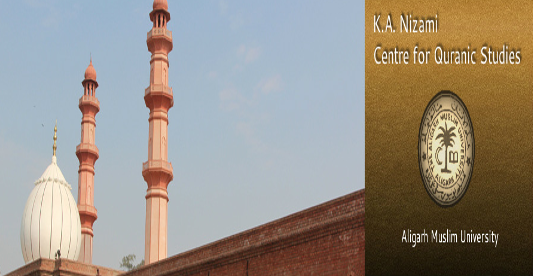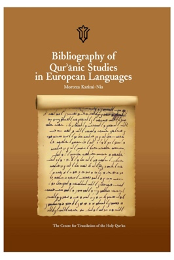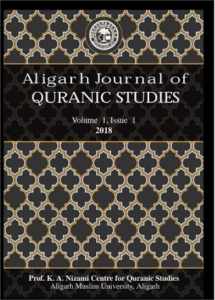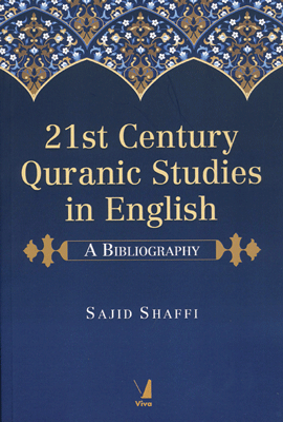
In the twenty-first century academic world, a surge of literature is being produced on Islam, especially on its primary sources —the noble Qur’an and Hadith/ Seerah. Globally reputed publishers—such as Ashgate, Brill, Cambridge, Edinburg, Harvard, Kube, Oxford, Palgrave, Princeton, Routledge, Springer, etc.,—all continue to publish a good number of works on Islam, and things Islamic. In this scholarship on Islam, one of the interesting and exciting academic sub-fields, which spreads over a number of branches, and to which Muslims and non-Muslims (orientalists/ Islamicists: literally ‘those who study Islam academically’) have contributed extensively, is the area of the Qur’anic Studies—the studies related to varied aspects of the Qur’an. The major branches in the area of Qur’anic Studies include the following: ‘Ulum al-Qur’an, tafsir literature, translations of the Qur’an in various languages (especially Arabic, Urdu, English and other languages), and such new trends as Qur’anic hermeneutics, contextualist approach to Qur’an, thematic interpretations of the Qur’an, simple introductions to the Qur’an, and personal wrestling(s) with the Sacred Text.
“Qur’anic Studies is precisely defined as the studies related to varied aspects of the Qur’an, with a number of branches, ranging from tafsir literature, translations of the Qur’an in various languages to such trends as Qur’anic hermeneutics, contextualist approach to Qur’an, thematic interpretations of Qur’an, simple introductions to the Qur’an, and personal wrestling(s) with the Sacred Text.”
In a piece titled “Growing Pains of Qur’anic Studies” on the IQSAWEB website, Devin Stewart describes the growth and expansion of the Qur’anic Studies in these words:
“On the one hand, the explosion of interest in the Qur’an over the past several decades is a blessing, as it has produced a sharp rise in the rate at which scholarship in Qur’anic studies is being produced, as well as in the number of different approaches. Entire fields of inquiry that had been moribund for the latter half of the twentieth century have now come alive, including study of the manuscript traditions of the Qur’an and the relationship between the Qur’an and Jewish and Christian texts. On the other hand, such burgeoning interest means that, as with Biblical scholarship, the number of people writing on the topic is large, the number of studies is huge, and one must wade through a morass of published material presenting rehashed versions of old theses in order to find significant advances”.
An interesting (emerging) category in this field, which is no doubt significant but found scarcely (especially in the English language), is the publication of ‘bibliographies’ on the Qur’anic Studies. A ‘bibliographical work’ is generally defined as a book which provides ‘a list of sources of information on a given subject, period, etc.’; ‘a list of writings relating to a given subject’; and ‘a list often descriptive or critical notes of writings related to a particular subject, period, or author.’
In his essay, “New! A Bibliography of Qur’anic Studies” Andrew Rippin writes about the Qur’anic studies bibliographies in these words:
“A bibliography is defined as ‘a list of writings relating to a given subject’. It is that, of course, but it is also so very much more. A bibliography serves to define a field of study and to document that field’s history, contours, and participants. It displays in a lucid way how areas of interest come and go over time, and, in its silences and absences, suggests areas of investigation that still need attention”. He further is of the opinion that “a bibliography is primarily a research tool, one that allows us access to what other scholars have investigated. The importance of that cannot be overstated. Scholarship must take place as a conversation, a back-and-forth between the individual academic and the scholarly community. It is only in such a way that scholarship can move ahead; that is also how we come to understand the history of why certain questions have become focal points for investigation and why research questions are framed in the way that they are. Every new piece of scholarship must, if it is to be useful and significant, stand in an acknowledged relationship with what has come before it.”
Bibliographies in the field of Qur’anic Studies
In the subfield of Qur’anic Studies, bibliographies started to emerge as early as late 1920s. Sage Jr. Woolworth Wm published one of the earliest bibliographies in 1927. His “A Bibliography of Koran Texts and Translations”, published in ‘The Muslim World’ is linguistically and chronologically arranged, and has paved the way for similar works.
Some prominent examples of this genre include Ekmeleddin Ihsanoglu’s World Bibliography of the Translations of the Meanings of  the Holy Quran (1980); Adil Usmani’s Islamic Studies: Literature on the Qur’an in the English Language: A Bibliography (1986); Fawzi Mikhail Tardos’ The Holy Koran [Qur’an] in the Library of Congress: A Bibliography (1993); AbulHasan M. Sadeq and Nazrul Islam’s Contributions to Islamic Knowledge: Abstracts of Dissertations and Theses on Islamic Subjects, 1924-1998 (1999); Morteza Karimi-Nia’s Bibliography of the Quranic Studies in European Languages (2012); and Abdur Raheem Kidwai’s four works: “Reference Works on the Qur’an in English: A Survey” ; Bibliography of the Translations of the Meanings of the Glorious Qur’an into English (2007); Translating the Untranslatable: A Critical Guide to 60 Translations of the Qur’an (2011); and God’s Word, Man’s Interpretation: A Critical Study of the 21st Century English Translations of the Quran (2018; my review of this can be found here).
the Holy Quran (1980); Adil Usmani’s Islamic Studies: Literature on the Qur’an in the English Language: A Bibliography (1986); Fawzi Mikhail Tardos’ The Holy Koran [Qur’an] in the Library of Congress: A Bibliography (1993); AbulHasan M. Sadeq and Nazrul Islam’s Contributions to Islamic Knowledge: Abstracts of Dissertations and Theses on Islamic Subjects, 1924-1998 (1999); Morteza Karimi-Nia’s Bibliography of the Quranic Studies in European Languages (2012); and Abdur Raheem Kidwai’s four works: “Reference Works on the Qur’an in English: A Survey” ; Bibliography of the Translations of the Meanings of the Glorious Qur’an into English (2007); Translating the Untranslatable: A Critical Guide to 60 Translations of the Qur’an (2011); and God’s Word, Man’s Interpretation: A Critical Study of the 21st Century English Translations of the Quran (2018; my review of this can be found here).
Two new (and recent) additions in this treasure house of bibliographies are Sajid Shaffi’s 21st Century Quranic Studies in English: A Bibliography [2018; hereinafter shortened as Bibliography], and Academic Research on the Quran: A Critical Bibliography [2019; hereinafter shortened as Critical Bibliography], published by Viva Books, New Delhi in association with K. A. Nizami Center for Quranic Studies (CQS) at Aligarh Muslim University (AMU), Aligarh India.
With this backdrop in mind, this review article presents an assessment of these two recently published Bibliographies by Sajid Shaffi. But before that, it is pertinent to mention here, very briefly, about Aligarh Muslim University’s K.A. Nizami Center for Qur’anic Studies.
K. A. Nizami Center for Quranic Studies (CQS)
The K. A. Nizami Center for Quranic Studies (henceforth CQS), India, is focused on “the study of Quran and related subjects.” Named after Professor Khaliq Ahmad Nizami (1925-97), the Centre is committed to “the advancement of academic excellence in teaching, research and publication,” and it provides “a meeting point between the Islamic and Western worlds of learning”. The major ‘aims and objectives’ of the Centre are: (i) to promote research in the field of Qur’anic exegesis (tafsir), especially South Asia; (ii) to provide an academic forum for scholars whose academic interests focus on any aspect of the Qur’an; (iii) to promote the educational and cultural advancement of Muslims of India; and (iv) to enable the students of the Qur’an to gain or renew their acquaintance with the latest developments in the field of Qur’anic Studies.
The Centre has been active in organizing seminars/ conferences, lectures, and in publishing books on various aspects of Qur’anic Studies. In order to show more dynamism towards research, The Center has recently come up with the idea of an academic research journal (Aligarh Journal of Quranic Studies [AJQS]) as well. The inaugural issue of AJQS (Vo. 1, No. 1, Winter 2018) included scholarly papers from young and senior scholars (both from India and abroad): a glimpse of this can be estimated from the titles and their authors:
- Professor Abdallah El-Khatib, “Lost in Translation: The Ideological Effects of the Translator and the Interpreter on the Qur’ānic Text”;
- Muhammad Junaid Nadvi & Z. Junaid, “The Economic Philosophy of Holy Qur’ān (A Study of Sources & Foundations)”;
- Professor Abdur Raheem Kidwai, “Abdul Majid Daryabadi’s English Translation of and Commentary on the Quran (1957): An Assessment”;
- Dr Tauseef Ahmad Parray, “Shura-Democracy Nexus in the Selected Urdu Tafaseer of the Sub-Continent: A Comparative Study” & “K. Nizami Center for Quranic Studies and 21st Century Quranic Studies in English”;
- Syed Ali Hur Kamoonpuri, “A Quran-based Approach to Effective Anger Management in light of Arabic Sources”;
- Gowhar Quadir Wani, “Maqṣadiyyah (Purposefulness) and Maqāṣid al-Qur’ān (Objectives of the Qur’ān): A Study”; and
- Sajid Shaffi, “Doctoral Theses on the Qur’anic Studies: A Bibliography” and “Qur’an Translations in Indian Regional Languages: A Bibliography”.
Besides, the Centre has published, in the last few years, around two dozen books (in Urdu and English) on various aspects of Qur’anic Studies (a list of these works can be accessed here).
Qur’anic Studies Bibliographies published by CQS
CQS, India is focused, as mentioned above, on “the study of Quran and related subjects”, and one of the major ‘aims and objectives’ of this Centre is “to promote research in the field of Qur’anic exegesis (tafsir)”. Besides, the Centre has been active in publishing books on various aspects of Qur’anic Studies, and among its recently published works include two bibliographical works by Sajid Shaffi in 2018 and 2019. Below is presented an assessment of these two recently published Bibliographies.
Sajid Shaffi, 21st Century Quranic Studies in English: A Bibliography (New Delhi: Viva Books Private Limited, 2018); Pages: 248; ISBN: 978-93-87486-35-5; Price: 795/- (Indian Rupees)
Consisting of around 250 pages, this Bibliography is divided into five parts, excluding the Preface (pp. xiii-xiv) and a ‘Foreword’ by Prof. A. R. Kidwai (pp. ix-xi). Written by a young researcher, who is presently pursuing a PhD at the Department of Islamic Studies, AMU (on “The Orientalists’ English Translations of the Qur’an…”), this Bibliography lists and “covers works on 21st century Qur’anic Studies in English”, numbering 2000 (arranged alphabetically in each part and category, but numbered sequentially from 1—2000), which “includes the bibliographical details of the works related to the Quran in English—[complete] translations (45), books (400), journal articles/ book chapters (1200) and book reviews (200) in addition to unpublished theses/ dissertations (100)”. It lists these works under five different broad categories: English Translations of the Qur’an; Books on the Qur’an; Articles on the Qur’an; Book Reviews on the Qur’anic Studies; and Theses on the Qur’an (p. xiii). An additional feature of this work is a list on ‘Reference Works on the Quran,’ ‘List of Selected Journals,’ among others. These categories are further sub-divided thematically. Thus, Shaffi’s Bibliography is a reference work that promises to be “indispensable for the students of Quranic studies”.
In the Foreword, Prof. Kidwai highlights the importance of publishing such kind of works: “a Bibliography stands out as an excellent source of information … [and] is much more than a treasure house of hard information about the latest publications in the field. More importantly, it projects for a discerning eye [on] the main contours, emerging trends, thrust areas and geo-political dimensions of the area of study under discussion” (p. ix). Moreover, he highlights in clear terms the main goal of this Bibliography by saying that it “affirms the pivotal position which the Quran enjoys in the world of scholarship” and thus highlights the “thematic diversity” of this scholarship. It underscores the “active participation of scholars of almost all parts of the world in the Quranic discourse”—Muslims (of Middle East, Asia, and Muslims settled in the West) and non-Muslims, or Western scholars/ Orientalists (pp. ix, x).
In his concise Preface (pp. xiii-xiv), the author, besides highlighting the importance and structure of the Bibliography, points out that while “maintaining hierarchy of the contents,” this Bibliography provides a detailed list of the 45 complete “English translations of the Quran” in the alphabetical order, which have been published between 2000-2016 (Part-I, entries 1-45). This forms Part-I (pp. 1-6) of the work. It is followed by ‘Books on the Quran’ (part-II, pp. 7-43; entries 46-472) under seven categories, ranging from introducing the Quran to contemporary issues; ‘Articles on the Quran’ (Part-III, pp. 43-177) consists of sixteen categories and includes entries from serial 473-1701; ‘Book Reviews on the Quranic Studies’ (Part-IV, pp. 177-196) includes entries from serial 1702 to serial 1899. These have been further categorized and classified, thematically, under specific headings: ranging from “Theology/ Metaphysics; The Quran and Prophet Muhammad (pbuh); History of the Collection and Codex of the Quran; Art of the Quran Recitation; The Quran Translations and Translators; Interpreting the Quran” to such categories like ‘Law’, ‘Sufism’, ‘Comparative Religions/ Scriptures’, ‘Art and Architecture’, ‘Science’, in the Quranic Context. It also includes a list of the works which highlight “Contemporary Issues in the Quranic Context (Current Issues and the Quran/ Feminism and Related Issues); Orientalist Polemics and Muslim Responses” (pp. xiii-xiv). For instance, in these last two categories, entries from 1440-1587 and 1588-1638 are included, respectively.
Moreover, in Part-V, ‘Theses on the Quran’ (pp. 197-208), it provides a list of 100 PhD and Masters Theses/ Dissertations (numbering from serial 1900-1976 & 1977-2000, respectively). This is followed by (i) a list of 47 ‘Reference Works on the Quran’, which are sub-divided into Bibliographies, Concordances, Subject/ Content Guides, Catalogues, Dictionaries, and Encyclopaedias (pp. 209-212); and (ii) ‘List of Selected Journals’ which are 40 in number (pp. 213-14). It ends with the reader-friendly ‘Author Index’ (pp. 215-229), which, though in alphabetical order, lists the names of authors along with the entry number(s), which makes it easy to locate an author’s number of writings in different categories.
Thus, Sajid Shaffi’s 21st Century Quranic Studies in English: A Bibliography—which has numerous reader-friendly features—is a treasure house of the works/ scholarship on the Qur’anic Studies produced from 2000 onwards. It is a useful resource, which will be helpful equally to the students and experts of Qur’anic Studies.
Sajid Shaffi, Academic Research on the Quran: A Critical Bibliography (New Delhi: Viva Books Private Limited, 2019); Pages: 143; ISBN: 978-93-88653-24-4; Price: 695/- (Indian Rupees)
Shaffi’s Academic Research on the Quran: A Critical Bibliography [hereinafter shortened as Critical Bibliography is an extension of his previous work to the treasure house of bibliographies, and is published by Viva Books in association with CQS.
Consisting of around 150 pages, this Critical Bibliography is divided into 21 (I-XXI) parts, excluding a ‘Foreword’ by Professor Kidwai (pp. vii-viii), the Preface (pp. ix-x), Acknowledgements (p. xi), and two sections titled ‘Cross Referencing’ (pp. 12-24) and ‘Author Index’ (pp. 125-31). The work is a “bibliographical study of Doctoral and Masters Theses on the Qur’an in English with a synoptic view of these theses”. It “lists 364 doctoral and 126 Masters Theses on the Qur’an with the annotation on selected doctoral theses, specified under various sections and sub-sections”. The work is based on the “data retrieved from more than 100 online official archives of different universities from all over the world and other data bases for which access [to the author] has been provided by Maulana Azad Library”, AMU (pp. ix, x).
In the ‘Preface’ (pp. ix-x), Shaffi highlights the importance and structure of the Critical Bibliography and points out that this work is both an extension of his previous work as well as a latest addition to the above mentioned works in this category. Shaffi’s work provides an annotated/ a brief assessment of around 500 ‘Doctoral and Masters Theses on the Qur’an in English’. The work, divided into 21 chapters, provides a list of these theses’ thematically; and some of the broad categories, in which he enlists them, are: Qur’anic commentaries of classical and modern periods; issues of translatability (both comparative and lexical); Gender/ Current contemporary issues in the Qur’an; Thematic/ Conceptual Studies of the Qur’an; Comparative Religions; Theological and Political debates; Western (orientalist) studies; Juristic issues; Knowledge, Education, Ethics, and Science in Qur’an; Qur’an in the Digital World, and so on.
In the Foreword, Prof. Kidwai highlights the main goal of this Critical Bibliography (and the author’s previous work): “Both the bibliographies provide an excellent opportunity to all the students of the Qur’an to gain acquaintance with the main and emerging contours of the Qur’anic scholarship in English” (p. vii). He also underscores the importance of preparing such bibliographies which “document the current trends in Qur’anic scholarship—the issues of gender, peaceful co-existence, interfaith dialogue, terrorism, environment, governance and economy” (p. vii). Prof. Kidwai admires the author both for his meticulous scholarship and hard work. He also highlights the main features of his work:
“Shaffi has done well in neatly categorizing some 500 Ph.D. studies [490 in total: 364 Doctoral and 126 Masters theses], carried out across the world in the leading universities under such helpful sections as tafsir of the Qur’an, issues of translatability and English translations of the Qur’an. It also projects contemporary issues, comparative religions, theology, jurisprudence, education, ethics, science and political discourse in the Qur’anic perspective. This thematic presentation is laudable, reader-friendly feature of the present work. The work stands out above other forays in this field” (p. vii)
Some of the important features of this Critical Bibliography are: It documents the current trends in Qur’anic scholarship; it highlights the research done on the issues of gender, peaceful co-existence, interfaith dialogue, terrorism, environment, governance, economy, vis-à-vis the Qur’an, thus being a practical manifestation of what M. A. S. Abdel Haleem mentioned in the Introduction of his translation (The Qur’an: A New Translation, 2005, p. ix): As the Qur’an is “intended for all times and all places”, therefore, in the twenty-first century as well, “evidence to support the various arguments is sought in the Qur’an” while struggling and “dealing with such universal issues as globalization, the environment, combating terrorism and drugs, issues of medical ethics, and feminism”. Shaffi’s work skillfully categorizes these theses’ under twenty-one (21) broad categories, which help in understanding the diverse range of subjects—from tafsir of the Qur’an, Translations, issues of Translatability, to Theological, Juristic, Political, Gender, Lexical issues, and from the Qur’an vis-à-vis Digital World and Qur’an and Ethics, Knowledge, Science, etc. It also provides a list of 57 theses through “a system of cross-referencing … which have been published in [the form of books and monographs, in between 1978 to 2018]” (p. x). The work also provides a “synoptic view” of most of the PhD thesis, as some titles shed little, or insufficient, light on their contents. It also adds an asterisk (*) with the Masters’ theses (which are left un-annotated), and enlists, in numeric, the Thesis-turned/ published-as-books. It has an ‘Author Index’ which enlists the prominent ones along with entry number, which help in locating a person easily. It is on the basis of these features that Prof. Kidwai has praised this work, and claims that it is a “laudable” and “reader-friendly” reference work which provides the readers with an “empirical information about the subject” as well as “fairly clear picture of the Qur’anic scholarship” (pp. vii-viii). The book is almost free from any grammatical errors, typos/ technical issues.
“Sajid Shaffi presents a treasure house of the works/ scholarship on the Qur’anic Studies. While his 21st Century Quranic Studies in English can be described as a reader-friendly and rich source of the works/ scholarship on the post-2000 Qur’anic Studies scholarship in the form of books, edited volumes, and research papers, his ‘Academic Research on the Quran’ is a collection of around 500 PhD and Masters’ Theses on Qur’anic Studies, produced in hundreds of reputed universities globally.”
Summary: The Two Bibliographies in Sum
It is fair to propose that with his two Bibliographies, Sajid Shaffi presents a treasure house of the works/ scholarship on the Qur’anic Studies. While his 21st Century Quranic Studies in English can be described as a reader-friendly and rich source of the works/ scholarship on the post-2000 Qur’anic Studies scholarship in the form of books, edited volumes, and research papers, his ‘Academic Research on the Quran’ is a collection of around 500 PhD and Masters’ Theses on Qur’anic Studies, produced in hundreds of reputed universities globally. Both of these works will help the budding researchers to get a clear idea regarding how much and what has been (and is being) written, explored, examined, and scrutinized on different aspects of the Qur’anic Studies. From these bibliographies one gets clues on the trends and developments that have occurred in the last few decades in this particular field of study. Both these Bibliographies can be described as reader-friendly and useful resources, equally helpful to the students and experts of Qur’anic Studies in general, and particularly to those who are eager to venture into the Qur’anic Studies field. Sajid Shaffi’s Bibliographies will serve as the first step for the new comers in the field of the Qur’anic Studies.
“Both these Bibliographies can be described as reader-friendly and useful resources, equally helpful to the students and experts of Qur’anic Studies in general, and particularly to those who are eager to venture into the Qur’anic Studies field. Sajid Shaffi’s Bibliographies will serve as the first step for the new comers in the field of the Qur’anic Studies.”
Dr Tauseef Ahmad Parray is Assistant Professor, Islamic Studies, Government Degree College for Women, Pulwama, Higher Education Department, Jammu & Kashmir (India). He is the author of ‘Towards Understanding Some Qur’anic Terms, Concepts, and Themes’ (Karachi, 2017), ‘Muslim Intellectual Deficit’ (Srinagar, 2018), ‘Mediating Islam and Modernity: Sir Sayyid, Iqbal, and Azad’ (New Delhi, 2019), ‘Exploring the Qur’an: Concepts and Themes’ (Srinagar, 2019), and Recent Trends in Qur’anic Scholarship (New Delhi, 2020).




